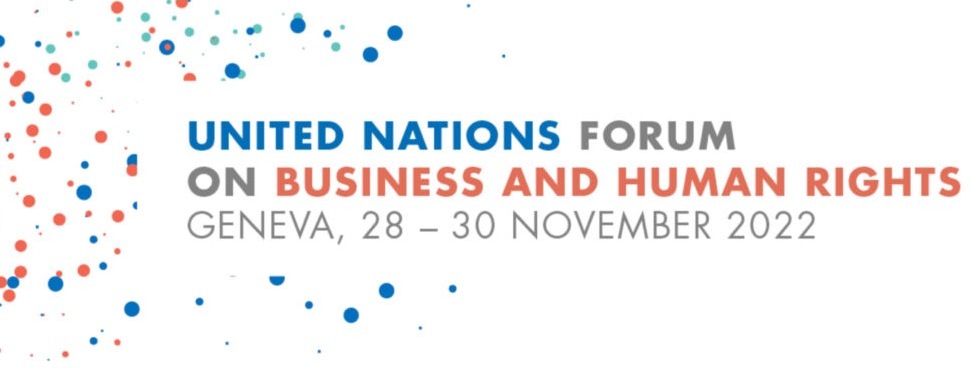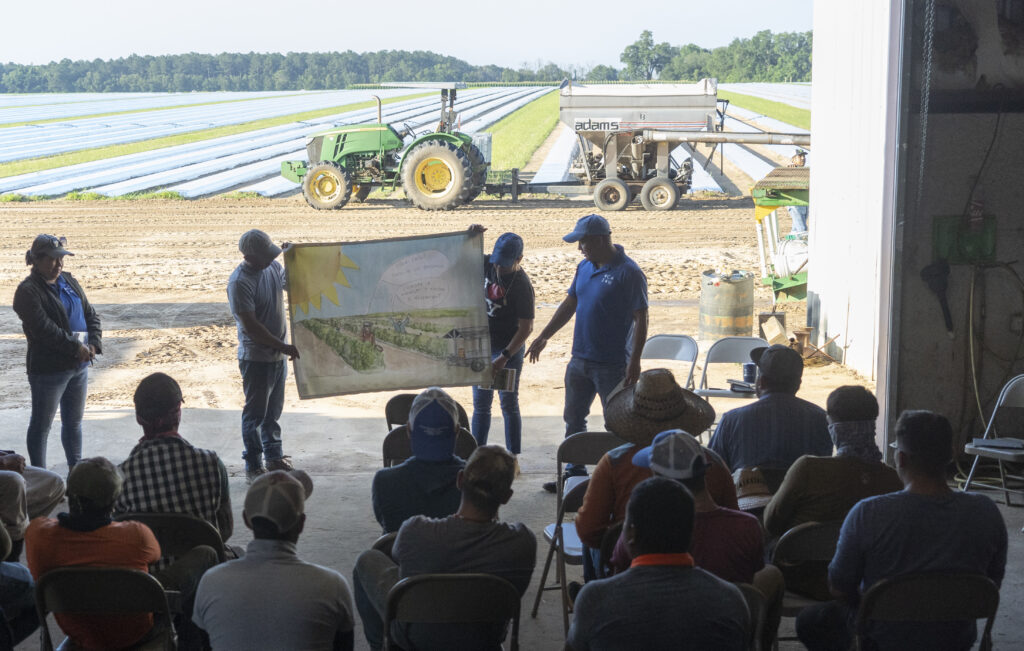
Theme of 11th annual forum: “Rights Holders at the Centre: Strengthening Accountability to Advance Business Respect for People and Planet for the Next Decade”
UN gathering, Fair Food Program panel, underscore growing consensus among human rights experts and business community alike that audit-based CSR model has failed, Worker-driven Social Responsibility is future of human rights protection in corporate supply chains;
FFP Participating Buyer Compass Group: “What the Coalition has created is a gold standard for the protection of human rights in our supply chain. Like many companies, we use several platforms and systems to gain insight and assurances in our supply chain, but the Coalition and the Fair Food Program has developed a unique approach to connecting companies with workers and to enforcing human rights protections”;
CIW: “The current audit system is not just inadequate, it’s actually been part of the problem for the past 30 years, and it needs to be replaced.”
Almost a decade ago, in 2013, the Coalition of Immokalee Workers and the Fair Food Standards Council were invited to speak at the 2nd annual UN Forum on Business and Human Rights about the then-fledgling Fair Food Program and its breakthrough mechanisms for protecting farmworkers against longstanding human rights abuses in food industry supply chains. Having launched only two years earlier, the Fair Food Program was still largely unknown in the human rights community at the global level. But on the ground in Florida it had already produced unprecedented gains for farmworkers under its protections, and those advances caught the attention of the United Nations’ Business and Human Rights Working Group, which had sent a delegation from Geneva to Immokalee earlier in the year to talk with workers about changes under the FFP and see the program in operation firsthand. Based on what that delegation found, the Working Group invited the CIW and FFSC to share their extraordinary new model with the international community at that year’s forum in December.
At the 2013 forum, the CIW’s Greg Asbed spoke on a panel entitled, “Responsible Supply Chain Management in Alignment with the UN Guiding Principles.” Asbed began his presentation by inviting the audience of business and human rights experts to participate in a “thought experiment” on a new model of social responsibility:
In honor of the fact that we are only 100 miles from the town of Berne, Switzerland, the town where Albert Einstein lived when he conducted the famous thought experiments that forever upended the way we think of space and time, I would like to begin by inviting you to join me in a thought experiment on social change, by thinking about this question:
What if workers – the rights holders themselves – designed their own social responsibility program? What would that program look like?…
Following a discussion of the Fair Food Program’s unique mix of monitoring and enforcement mechanisms, and a comparison of those tools to the superficial audits that make up the entirety of the traditional CSR model, Asbed concluded:

… In closing, the conclusion is simple. If the goal of the social responsibility program is to protect the public perception of a brand, then by all means the brand-holder should design the program because the brand-holder knows best how to protect its own image.
But if the goal of the program is to protect human rights, then the humans whose rights are at stake must themselves take the lead role in designing the program. And when such programs do exist – as is the case of the Fair Food Program in Florida agriculture — corporations connected to that supply chain must be held accountable to those standards. (read more)
The CIW’s presentation in 2013 asked forum-goers to imagine a new model of supply chain responsibility, one that centered workers themselves in the protection of their own human rights.
The CIW’s presentation last month in Geneva would take place on the same stage, but against a radically different backdrop.
2022: From New Model to New Consensus
Fast forward nine years to the 11th UN Forum on Business and Human Rights. Again, the CIW is invited, only this time to discuss the FFP’s track record of unprecedented success, more than a decade of measurable progress against longstanding human rights violations — from sexual assault to modern-day slavery — that no longer occur on farms under the program’s protections but continue to plague workplaces beyond the reach of those protections, factories and fields at the bottom of corporate supply chains around the globe. Meanwhile, over the course of that same decade, the traditional, audit-based Corporate Social Responsibility Program logged failure after failure, from deadly factory fires and collapses to serial slavery scandals, on land and at sea. And during that same time, study after study concluded that the audit-led CSR experiment was never truly equipped to identify, investigate, and remedy human rights violations in the first place, and as such was not fit for purpose and had run its course.
Indeed, a new consensus greeted the CIW team this time around at the annual UN forum, one reflected in the very theme of the 2022 gathering: “Rights Holders at the Centre: Strengthening Accountability to Advance Business Respect for People and Planet for the Next Decade”.
What a difference a decade makes. The new model, introduced just nine years ago to the global human rights community as a promising thought experiment, had become the new consensus, embraced by that same community of human rights and business experts as the way forward toward real, enforceable standards.
The Future of Human Rights Protection in Corporate Supply Chains
For decades prior to the Fair Food Program’s launch in 2011, the dominant paradigm for protecting human rights in global supply chains — Corporate Social Responsibility, or CSR — had gone unchallenged. During that time, billions of dollars went into building and funding an entire industry of for-profit auditors and certification schemes that were never, in fact, built to enforce the human rights standards they claim to uphold. Today, the CSR model, and the certification schemes designed according to its precepts, have been roundly and thoroughly discredited,. Meanwhile, the Worker-driven Social Responsibility model, or WSR, was born in the tomato fields of Florida and has since been scaled and replicated, and is now operating on three continents and in multiple industries, from apparel to construction.
Today, WSR, not CSR, is the future of human rights protection in corporate supply chains. The message from the 2022 forum in Geneva couldn’t be more clear: The paradigm shift has begun, though, like the transition underway today from the internal combustion engine to the electric cars of the future, it will take some time for all the vested interests and infrastructure of the old paradigm to give way to the new. A long, uphill climb remains ahead before Worker-driven Social Responsibility becomes the norm, rather than the exception.
But it was against that backdrop of transformation that Lucas Benitez and Greg Asbed of the CIW — joined by Graham Givens, representing Compass Group, a leading FFP Participating Buyer, and Antonella Angelini, an academic expert in the field of human rights — presented last month in a plenary session of the 2022 UN Forum on Business and Human Rights. Together they formed a panel, entitled “The Importance of Rights Holder Perspectives in the Design of Remedial Mechanisms,” and for one hour and 20 minutes the panelists presented and took questions from an audience of business and human rights experts. Here below are excerpts from that panel.
NOTE: While the event began with remarks prepared by the panelists, perhaps the most compelling segment of the 80 minutes was the last 40 minutes dedicated to Questions & Answers, where the new consensus — in short, CSR is dead, long live WSR — is laid bare by the many questions, and the assumptions built into those questions, from the audience, and in the dialogue those questions provoked. We have placed 11 minutes of excerpts of the Q&A session at the top of the videos below, so that if you have limited time and would like to get to the heart of the panel’s message, you might want to start with the video labeled “Q&A”. Enjoy!
